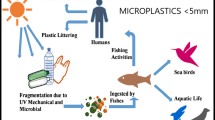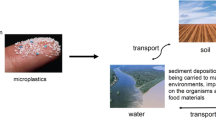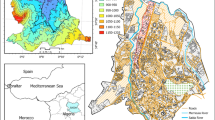Abstract
Microplastics (MPs) are small (< 5 mm) plastic particles that are widely found in marine, freshwater, terrestrial and atmospheric environments. Due to their prevalence and persistence, MPs are considered an emerging contaminant of environmental concern. The separation and quantitation of MPs from freshwater sediments is a challenging and critical issue. It is necessary to identify the fate and sources of MPs in the environment, minimise their release and adverse effects. Compared to marine sediments, standardised methods for extracting and estimating the amount of MPs in freshwater sediments are relatively limited. The present study focuses on MP recovery efficiency of four commonly used salt solutions (NaCl, NaI, CaCl2 and ZnCl2) for isolating MPs during the density separation step from freshwater sediment. Known combinations of artificial MP particles (PS, PE, PVC, PET, PP and HDPE) were spiked into standard river sediment. Extraction using NaI, ZnCl2 and NaCl solutions resulted in higher recovery rates from 37 to 97% compared to the CaCl2 solution (28–83%) and varied between polymer types. Low-density MPs (PE, HDPE, PP and PS) were more effectively recovered (> 87%) than the denser polymers (PET and PVC: 37 to 88.8%) using NaCl, NaI and ZnCl2 solutions. However, the effective flotation of ZnCl2 and NaI solutions is relatively expensive and unsafe to the environment, especially in the context of developing countries. Therefore, considering the efficiency, cost and environmental criteria, NaCl solution was selected. The protocol was then tested by extracting MPs from nine riverine sediment samples from the Red River Delta. Sediments collected from urban rivers were highly polluted by MPs (26,000 MPs items·kg−1 DW) compared to sediments located downstream. Using a NaCl solution was found to be effective in this case study and might also be used in long-term and large-scale MP monitoring programmes in Vietnam.









Similar content being viewed by others
Data availability
The main part of the research data is included in the article. Other data can be made available from the corresponding author upon request.
References
Abdurahman, A., Cui, K., Wu, J., Li, S., Gao, R., Dai, J., Liang, W., & Zeng, F. (2020). Adsorption of dissolved organic matter (DOM) on polystyrene microplastics in aquatic environments: Kinetic, isotherm and site energy distribution analysis. Ecotoxicology and environmental safety, 198, p.110658. https://doi.org/10.1016/j.ecoenv.2020.110658
Abidli, S., Toumi, H., Lahbib, Y., & Trigui El Menif, N. (2017). The first evaluation of microplastics in sediments from the complex lagoon-channel of Bizerte (northern Tunisia). Water, Air, and Soil Pollution, 228(7). https://doi.org/10.1007/s11270-017-3439-9
Alam, F. C., Sembiring, E., Muntalif, B. S., & Suendo, V. (2019). Microplastic distribution in surface water and sediment river around slum and industrial area (case study: Ciwalengke River, Majalaya district, Indonesia). Chemosphere, 224, 637–645. https://doi.org/10.1016/j.chemosphere.2019.02.188
Anderson, J. C., Park, B. J., & Palace, V. P. (2016). Microplastics in aquatic environments: Implications for Canadian ecosystems. Environmental Pollution, 218, 269–280. https://doi.org/10.1016/j.envpol.2016.06.074
Andrady, A. L. (2011). Microplastics in the marine environment. Marine Pollution Bulletin, 62(8), 1596–1605. https://doi.org/10.1016/j.marpolbul.2011.05.030
Arthur, C., Baker, J., & Bamford, H. (2009). Proceeding of the International research workshop on the occurrence, effects, and fate of microplastic marine debris, Sept 9-11, 2008. NOAA Technical Memorandum NOS-OR&R-30.
Barnes, D. K., Galgani, F., & Thompson, R. C. (2009). Accumulation and fragmentation of plastic debris in global environments. Philosophical Transactions of the Royal Society B, 364(1526), 1985–1998. https://doi.org/10.1098/rstb.2008.0205
Barrows, A. P. W., Christiansen, K. S., Bode, E. T., & Hoellein, T. J. (2018). A watershed-scale, citizen science approach to quantifying microplastic concentration in a mixed land-use river. Water Research, 147, 382–392. https://doi.org/10.1016/j.watres.2018.10.013
Batel, A., Linti, F., Scherer, M., Erdinger, L., & Braunbeck, T. (2016). Transfer of benzo[a]pyrene from microplastics to Artemia nauplii and further to zebrafish via a trophic food web experiment: CYP1A induction and visual tracking of persistent organic pollutants. Environmental Toxicology and Chemistry, 35(7), 1656–1666. https://doi.org/10.1002/etc.3361
Bellasi, A., Binda, G., Pozzi, A., Boldrocchi, G., & Bettinetti, R. (2021). The extraction of microplastics from sediments: An overview of existing methods and the proposal of a new and green alternative. Chemosphere, 278, 130357. https://doi.org/10.1016/j.chemosphere.2021.130357
Claessens, M., van Cauwenberghe, L., Vandegehuchte, M. B., & Janssen, C. R. (2013). New techniques for the detection of microplastics in sediments and field collected organisms. Marine Pollution Bulletin, 70(1–2), 227–233. https://doi.org/10.1016/j.marpolbul.2013.03.009
Cole, M., Lindeque, P., Halsband, C., & Galloway, T. S. (2011). Microplastics as contaminants in the marine environment: A review. Marine Pollution Bulletin, 62(12), 2588–2597. https://doi.org/10.1016/j.marpolbul.2011.09.025
Coppock, R. L., Cole, M., Lindeque, P. K., Queirós, A. M., & Galloway, T. S. (2017). A small-scale, portable method for extracting microplastics from marine sediments. Environmental Pollution, 230, 829–837. https://doi.org/10.1016/j.envpol.2017.07.017
Cutroneo, L., Reboa, A., Geneselli, I., & Capello, M. (2021). Considerations on salts used for density separation in the extraction of microplastics from sediments. Marine Pollution Bulletin, 166(December 2020), 112216. https://doi.org/10.1016/j.marpolbul.2021.112216
de Souza Petersen, E., Krüger, L., Dezevieski, A., Petry, M. V., & Montone, R. C. (2016). Incidence of plastic debris in sooty tern nests: A preliminary study on Trindade Island, a remote area of Brazil. Marine Pollution Bulletin, 105(1), 373–376. https://doi.org/10.1016/j.marpolbul.2016.02.036
Dehaut, A., Hermabessiere, L., & Duflos, G. (2019). Current frontiers and recommendations for the study of microplastics in seafood. TrAC - Trends in Analytical Chemistry. Elsevier B.V. https://doi.org/10.1016/j.trac.2018.11.011
Donoso J. M., & Rios-Touma B. (2020). Microplastics in tropical Andean rivers: A perspective from a highly populated Ecuadorian basin without wastewater treatment. Heliyon 6: e04302. https://doi.org/10.1016/j.heliyon.2020.e04302
Dong, Y., Gao, M., Song, Z., & Qiu, W. (2020). As (III) adsorption onto different-sized polystyrene microplastic particles and its mechanism. Chemosphere, 239, p.124792. https://doi.org/10.1016/j.chemosphere.2019.124792
Eerkes-Medrano, D., Thompson, R. C., & Aldridge, D. C. (2015). Microplastics in freshwater systems: A review of the emerging threats, identification of knowledge gaps and prioritisation of research needs. Water Research, 75, 63–82. https://doi.org/10.1016/j.watres.2015.02.012
Europe, P. (2018). Plastics – The facts. Plastics – The facts 2018, 38.
Felsing, S., Kochleus, C., Buchinger, S., Brennholt, N., Stock, F., & Reifferscheid, G. (2018). A new approach in separating microplastics from environmental samples based on their electrostatic behavior. Environmental Pollution, 234, 20–28. https://doi.org/10.1016/j.envpol.2017.11.013
Fischer, E. K., Paglialonga, L., Czech, E., & Tamminga, M. (2016). Microplastic pollution in lakes and lake shoreline sediments - A case study on Lake Bolsena and Lake Chiusi (central Italy). Environmental Pollution, 213, 648–657. https://doi.org/10.1016/j.envpol.2016.03.012
Fries, E., Dekiff, J. H., Willmeyer, J., Nuelle, M. T., Ebert, M., & Remy, D. (2013). Identification of polymer types and additives in marine microplastic particles using pyrolysis-GC/MS and scanning electron microscopy. Environmental Science. Processes & Impacts, 15(10), 1949. https://doi.org/10.1039/c3em00214d
GESAMP. (2019). Guidelines or the monitoring and assessment of plastic litter and microplastics in the ocean. (IMO/FAO/UNESCO-IOC/UNIDO/WMO/IAEA/UN/UNEP/UNDP/ISA Joint Group of Experts on the Scientific Aspects of Marine Environmental Protection), Rep. Stud. GESAMP No. 99, 130 pp.
Geyer, R., Jambeck, J. R., & Law, K. L. (2017). Production, use, and fate of all plastics ever made. Science Advances, 3(7), 25–29. https://doi.org/10.1126/sciadv.1700782
Grbic, J., Nguyen, B., Guo, E., You, J. B., Sinton, D., & Rochman, C. M. (2019). Magnetic extraction of microplastics from environmental samples. Environmental Science and Technology Letters, 6(2), 68–72. https://doi.org/10.1021/acs.estlett.8b00671
He, D., Zhang, X., & Hu, J. (2021). Methods for separating microplastics from complex solid matrices: Comparative analysis. Journal of Hazardous Materials, 409, p.124640. https://doi.org/10.1016/j.jhazmat.2020.124640
Hengstmann, E., Tamminga, M., vom Bruch, C., & Fischer, E. K. (2018). Microplastic in beach sediments of the Isle of Rügen (Baltic Sea) - Implementing a novel glass elutriation column. Marine Pollution Bulletin, 126, 263–274. https://doi.org/10.1016/j.marpolbul.2017.11.010
Hidalgo-Ruz, V., Gutow, L., Thompson, R. C., & Thiel, M. (2012). Microplastics in the marine environment: A review of the methods used for identification and quantification. Environmental Science and Technology, 46(6), 3060–3075. https://doi.org/10.1021/es2031505
Hoai, P. M., Ngoc, N. T. Minh, N. H., Viet, P. H., Berg, M., Alder, A. C., & Giger, W. (2010). Recent levels of organochlorine pesticides and polychlorinated biphenyls in sediments of the sewer system in Hanoi Vietnam. Environmental Pollution, 158(3):913 920. https://doi.org/10.1016/j.envpol.2009.09.018
Horton, A. A., Svendsen, C., Williams, R. J., Spurgeon, D. J., & Lahive, E. (2017). Presence and abundance of microplastics in sediments of tributaries of the River Thames, UK. In Fate and Impact of Microplastics in Marine Ecosystems (pp. 6–7). Elsevier. https://doi.org/10.1016/b978-0-12-812271-6.00182-4
Hurley, R., Woodward, J., & Rothwell, J. J. (2018). Microplastic contamination of river beds significantly reduced by catchment-wide flooding. Nature Geoscience, 11, 251. https://doi.org/10.1038/s41561-018-0080-1
Imhof, H. K., Schmid, J., Niessner, R., Ivleva, N. P., & Laforsch, C. (2012). A novel, highly efficient method for the separation and quantification of plastic particles in sediments of aquatic environments. Limnology and Oceanography: Methods. https://doi.org/10.4319/lom.2012.10.524
Jambeck, J. R., Geyer, R., Wilcox, C., Siegler, T. R., Perryman, M., Andrady, A., et al. (2015). Plastic waste inputs from land into the ocean. Science, 347(6223), 768–771. https://doi.org/10.1126/science.1260352
Jiang, C., Yin, L., Li, Z., Wen, X., Luo, X., Hu, S., et al. (2019). Microplastic pollution in the rivers of the Tibet Plateau. Environmental Pollution, 249, 91–98. https://doi.org/10.1016/j.envpol.2019.03.022
Kedzierski, M., le Tilly, V., César, G., Sire, O., & Bruzaud, S. (2017). Efficient microplastics extraction from sand. A cost effective methodology based on sodium iodide recycling. Marine Pollution Bulletin, 115(1–2), 120–129. https://doi.org/10.1016/j.marpolbul.2016.12.002
Klein, S., Worch, E., & Knepper, T. P. (2015). Occurrence and spatial distribution of microplastics in river shore sediments of the Rhine-Main area in Germany. Environmental Science & Technology, 49(10), 6070–6076. https://doi.org/10.1021/acs.est.5b00492
Kowalski, N., Reichardt, A. M., & Waniek, J. J. (2016). Sinking rates of microplastics and potential implications of their alteration by physical, biological, and chemical factors. Marine Pollution Bulletin, 109(1), 310–319. https://doi.org/10.1016/j.marpolbul.2016.05.064
Lambert, S., & Wagner, M. (2018). Microplastics are contaminants of emerging concern in freshwater environments: An overview. In Handbook of Environmental Chemistry (Vol. 58, pp. 1–23). Springer Verlag. https://doi.org/10.1007/978-3-319-61615-5_1
Lebreton, L. C. M., van der Zwet, J., Damsteeg, J. W., Slat, B., Andrady, A., & Reisser, A. (2017). River plastic emissions to the world’s oceans. Nature Communications, 8. https://doi.org/10.1038/ncomms15611
Leslie, H. A., Brandsma, S. H., van Velzen, M. J. M., & Vethaak, A. D. (2017). Microplastics en route: Field measurements in the Dutch river delta and Amsterdam canals, wastewater treatment plants, North Sea sediments and biota. Environment International, 101, 133–142. https://doi.org/10.1016/j.envint.2017.01.018
Li, J., Zhang, K., & Zhang, H. (2018). Adsorption of antibiotics on microplastics. Environmental Pollution, 237, 460–467. https://doi.org/10.1016/j.envpol.2018.02.050
Lin, L., Zuo, L. Z., Peng, J. P., Cai, L. Q., Fok, L., Yan, Y., Li, H. X., & Xu, R. (2018). Occurrence and distribution of microplastics in an urban river: A case study in the Pearl River along Guangzhou City. China. Science of the Total Environment., 644, 375–381. https://doi.org/10.1016/j.scitotenv.2018.06.327
Lots, F. A. E., Behrens, P., Vijver, M. G., Horton, A. A., & Bosker, T. (2017). A large-scale investigation of microplastic contamination: Abundance and characteristics of microplastics in European beach sediment. Marine Pollution Bulletin, 123(1–2), 219–226. https://doi.org/10.1016/j.marpolbul.2017.08.057
Müller, A., Goedecke, C., Eisentraut, P., Piechotta, C., & Braun, U. (2020). Microplastic analysis using chemical extraction followed by LC-UV analysis: A straightforward approach to determine PET content in environmental samples. Environmental Sciences Europe, 32(1). https://doi.org/10.1186/s12302-020-00358-x
Nakajima, R., Tsuchiya, M., Lindsay, D. J., & Kitahashi, T. (2019). A New Small Device Made of Glass for Separating Microplastics from Marine and Freshwater Sediments. https://doi.org/10.7717/peerj.7915
Nel, H. A., Dalu, T., & Wasserman, R. J. (2018). Sinks and sources: Assessing microplastic abundance in river sediment and deposit feeders in an Austral temperate urban river system. Science of the Total Environment, 612, 950–956. https://doi.org/10.1016/j.scitotenv.2017.08.298
Nuelle, M. T., Dekiff, J. H., Remy, D., & Fries, E. (2014). A new analytical approach for monitoring microplastics in marine sediments. Environmental Pollution, 184, 161–169. https://doi.org/10.1016/j.envpol.2013.07.027
Paul-Pont, I., Lacroix, C., Gonzalez Fernandez, C., Hegaret, H., Lambert, C., Le Goic, N., Frere, L., Cassone, A.L., Sussarellu, R., Fabioux, C., Guyomarch, J., Albentosa, M., Huvet, A., & Soudant, P. (2016). Exposure of marine mussels Mytilus spp. to polystyrene microplastics: toxicity and influence on fluoranthene bioaccumulation. Environmental Pollution, 216, 724e737. https://doi.org/10.1016/j.envpol.2016.06.039
Peeken, I., Primpke, S., Beyer, B., Gütermann, J., Katlein, C., Krumpen, T., et al. (2018). Arctic sea ice is an important temporal sink and means of transport for microplastic. Nature Communications, 9(1). https://doi.org/10.1038/s41467-018-03825-5
Phuong, N. N., Fauvelle, V., Grenz, C., Ourgaud, M., Schmidt, N., Strady, E., & Sempéré, R. (2021). Highlights from a review of microplastics in marine sediments. Science of the Total Environment. Elsevier B.V. https://doi.org/10.1016/j.scitotenv.2021.146225
Quinn, B., Murphy, F., & Ewins, C. (2017). Validation of density separation for the rapid recovery of microplastics from sediment. Analytical Methods, 9(9), 1491–1498. https://doi.org/10.1039/c6ay02542k
Radford, F., Zapata-restrepo, L. M., Horton, A. A., Hudson, M. D., Shaw, J., & Williams, I. D. (2021). Analytical methods developing a systematic method for extraction of microplastics in soils, 1695–1705. https://doi.org/10.1039/d0ay02086a
Rainieri, S., Conlledo, N., Larsen, B. K., Granby, K., & Barranco, A. (2018). Combined effects of microplastics and chemical contaminants on the organ toxicity of zebrafish (Danio rerio). Environmental Research, 162, 135e143. https://doi.org/10.1016/j.envres.2017.12.019
Scherer, C., Weber, A., Stock, F., Vurusic, S., Egerci, H., Kochleus, C., et al. (2020). Comparative assessment of microplastics in water and sediment of a large European river. Science of the Total Environment, 738, 1–11. https://doi.org/10.1016/j.scitotenv.2020.139866
Shim, W. J., Hong, S. H., & Eo, S. E. (2017). Identification methods in microplastic analysis: A review. Royal Society of Chemistry. https://doi.org/10.1039/c6ay02558g
Singh, N., Mondal A., Bagri, A., Tiwari E., Khandelwal, N., Monikh, F. A., & Darbha, G. K. (2021). Characteristics and spatial distribution of microplastics in the lower Ganga River water and sediment. Marine Pollution Bulletin, 163. https://doi.org/10.1016/j.marpolbul.2020.111960
Stolte, A., Forster, S., Gerdts, G., & Schubert, H. (2015). Microplastic concentrations in beach sediments along the German Baltic coast. Marine Pollution Bulletin, 99, 216–229. https://doi.org/10.1016/j.marpolbul.2015.07.022
Strady, E., Dang, T. H., Dao, T. D., Dinh, H. N., Do, T. T. D., Duong, T. N., et al. (2021). Baseline assessment of microplastic concentrations in marine and freshwater environments of a developing Southeast Asian country Viet Nam. Marine Pollution Bulletin, 162. https://doi.org/10.1016/j.marpolbul.2020.111870
Su, L., Xue, Y., Li, L., Yang, D., Kolandhasamy, P., Li, D., & Shi, H. (2016). Microplastics in Taihu Lake, China. Environmental Pollution, 216, 711–719. https://doi.org/10.1016/j.envpol.2016.06.036
Taylor, M. L, Gwinnett, C., Robinson, L. F., & Woodall, L. C. (2016). Plastic microfibre ingestion by deep-sea organisms. Scientific Reports, 6. https://doi.org/10.1038/srep33997
Thompson, R. C., Moore, C. J., Saal, F. S. V., & Swan, S. H. (2009). Plastics, the environment and human health: Current consensus and future trends. Philosophical Transactions of the Royal Society B: Biological Sciences, 364(1526), 2153–2166. https://doi.org/10.1098/rstb.2009.0053
van Cauwenberghe, L., & Janssen, C. R. (2014). Microplastics in bivalves cultured for human consumption. Environmental Pollution, 193, 65–70. https://doi.org/10.1016/j.envpol.2014.06.010
van Cauwenberghe, L., Vanreusel, A., Mees, J., & Janssen, C. R. (2013). Microplastic pollution in deep-sea sediments. Environmental Pollution, 182, 495–499. https://doi.org/10.1016/j.envpol.2013.08.013
Wagner, M., Scherer, C., Alvarez-Muñoz, D., Brennholt, N., Bourrain, X., Buchinger, S., et al. (2014). Microplastics in freshwater ecosystems: What we know and what we need to know. Environmental Sciences Europe, 26(1), 1–9. https://doi.org/10.1186/s12302-014-0012-7
Wang, J., Peng, J., Tan, Z., Gao, Y., Zhan, Z., Chen, Q., & Cai, L. (2017). Microplastics in the surface sediments from the Beijiang River littoral zone: Composition, abundance, surface textures and interaction with heavy metals. Chemosphere, 171, 248–258. https://doi.org/10.1016/j.chemosphere.2016.12.074
Wang, Q., Zhang, Y., Wangjin, X., Wang, Y., Meng, G., & Chen, Y. (2020). The adsorption behavior of metals in aqueous solution by microplastics effected by UV radiation. Journal of Environmental Sciences, 87, 272–280. https://doi.org/10.1016/j.jes.2019.07.006
Wu, C., Zhang, K., & Xiong, X. (2018). Microplastic pollution in inland waters focusing on Asia. Spring Chem, 58, 85–99.
Xia, F., Yao, Q., Zhang, J., & Wang D. (2021). Effects of seasonal variation and resuspension on microplastics in river sediments. Environmental Pollution, 286, 117403. https://doi.org/10.1016/j.envpol.2021.117403
Yuan, W., Liu, X., Wang, W., Di, M., & Wang, J. (2019). Microplastic abundance, distribution and composition in water, sediments, and wild fish from Poyang Lake, China. Ecotoxicology and Environmental Safety, 170, 180–187. https://doi.org/10.1016/j.ecoenv.2018.11.126
Zhang, B., Chen, L., Chao, J., Yang, X., & Wang, Q. (2020). Research progress of microplastics in freshwater sediments in China. Environmental Science and Pollution Research, 27, 31046–31060. https://doi.org/10.1007/s11356-020-09473-x
Zhang, L., Liu, J., Xie, Y., Zhong, S., Yang, B., Lu, D., & Zhong, Q. (2020). Distribution of microplastics in surface water and sediments of Qin river in Beibu Gulf China. Science of the Total Environment, 708, 135176 https://doi.org/10.1016/j.scitotenv.2019.135176
Funding
This research was funded by the Vietnam National Foundation for Science and Technology Development (NAFOSTED) under grant number 11/2020/TN. The authors would like to thank the COMPOSE project, funded by the French MEAE and conducted by the IRD and French Embassy in Vietnam for providing research facilities. The authors also thank many individuals for their help in collecting the samples in the field.
Author information
Authors and Affiliations
Corresponding author
Ethics declarations
Conflict of interest
The authors declare no competing interests.
Additional information
Publisher's Note
Springer Nature remains neutral with regard to jurisdictional claims in published maps and institutional affiliations.
Supplementary information
Below is the link to the electronic supplementary material.
Rights and permissions
About this article
Cite this article
Duong, T.T., Le, P.T., Nguyen, T.N.H. et al. Selection of a density separation solution to study microplastics in tropical riverine sediment. Environ Monit Assess 194, 65 (2022). https://doi.org/10.1007/s10661-021-09664-0
Received:
Accepted:
Published:
DOI: https://doi.org/10.1007/s10661-021-09664-0




